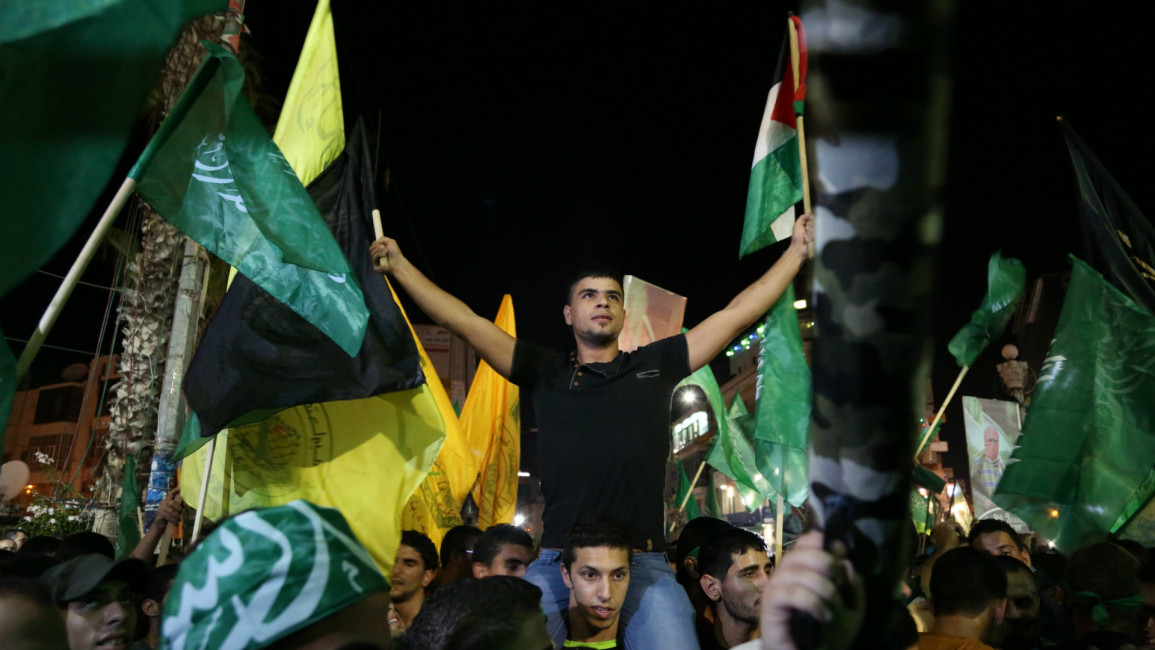Hamas reveals 'reconciliation deal' with Fatah
Hamas reveals 'reconciliation deal' with Fatah
After two days of talks in Doha, Hamas and Fatah have agreed to work closer towards resolving their differences, after the rival Palestinian factions have been fighting for a decade.
2 min read
Many Palestinians have urged Fatah and Hamas to reconcile for the sake of unity [Getty]
Hamas has reached an agreement with Fatah at the Doha dialogue after a two-day meeting in Qatar’s capital, the Islamist movement revealed on Tuesday.
The movement's spokesman said the deal sought to work towards unity "for the benefit of Palestinians".
During the past two days, Doha has hosted private talks between representatives from Fatah and Hamas to discuss the implementation of a reconciliation agreement and address previous obstacles.
"Both factions shared the same vision and will now begin to circulate the agreement among the leadership of both movements to begin implementation on the ground," read a press statement from Hamas issued late on Monday night.
The movement said that in a "brotherly and positive atmosphere" negotiators established steps to work towards a reconciliation agreement, and a timetable will soon be agreed.
According to Palestinian sources, the Doha meeting discussed the formation of a national unity government and the implementation of the 2012 Cairo agreement.
They also discussed the fate of security personnel in Gaza who were hired by Hamas after the 2007 split, as many fear that reconciliation could mean Fatah reinstating security officers into the Palestinian Authority that had been absorbed into Hamas ranks.
A date for Palestinian presidential and legislative elections after the formation of the government will also be set.
The New Arab has been told that efforts to secure the meeting with Hamas were led by Fatah leaders close to imprisoned Fatah figure Marwan al-Barghouthi, without prior coordination with Mahmoud Abbas, the chairman of Fatah and the PA.
But Abbas endorsed the peacemakers' efforts, asking them to coordinate their talks with Azzam al-Ahmad, a leading Fatah member and parliamentarian representing Jenin, other sources added.
Hamas figures who wished to remain anonymous told The New Arab the movement remained cautious, given the failure of similar deals in the past. That such reconciliation agreements had fallen though undermined the work of the "national accord government".
Another bone of contention is security coordination between Fatah and occupying Israeli forces against protest and armed activity in the West Bank.
The speed of this deal - coming in just two days of talks after nine years of often violent animosity - will likely suprise analysts and activist alike.
Tensions between the two parties have been heightened since 2007, when Fatah-aligned figures attempted to oust the elected Hamas movement from power. As a result of the internecine fighting which followed, Fatah was effectively routed from the Gaza Strip, while Hamas was pretty much shut down in the West Bank.
The movement's spokesman said the deal sought to work towards unity "for the benefit of Palestinians".
During the past two days, Doha has hosted private talks between representatives from Fatah and Hamas to discuss the implementation of a reconciliation agreement and address previous obstacles.
"Both factions shared the same vision and will now begin to circulate the agreement among the leadership of both movements to begin implementation on the ground," read a press statement from Hamas issued late on Monday night.
The movement said that in a "brotherly and positive atmosphere" negotiators established steps to work towards a reconciliation agreement, and a timetable will soon be agreed.
According to Palestinian sources, the Doha meeting discussed the formation of a national unity government and the implementation of the 2012 Cairo agreement.
They also discussed the fate of security personnel in Gaza who were hired by Hamas after the 2007 split, as many fear that reconciliation could mean Fatah reinstating security officers into the Palestinian Authority that had been absorbed into Hamas ranks.
A date for Palestinian presidential and legislative elections after the formation of the government will also be set.
The New Arab has been told that efforts to secure the meeting with Hamas were led by Fatah leaders close to imprisoned Fatah figure Marwan al-Barghouthi, without prior coordination with Mahmoud Abbas, the chairman of Fatah and the PA.
But Abbas endorsed the peacemakers' efforts, asking them to coordinate their talks with Azzam al-Ahmad, a leading Fatah member and parliamentarian representing Jenin, other sources added.
Hamas figures who wished to remain anonymous told The New Arab the movement remained cautious, given the failure of similar deals in the past. That such reconciliation agreements had fallen though undermined the work of the "national accord government".
Another bone of contention is security coordination between Fatah and occupying Israeli forces against protest and armed activity in the West Bank.
The speed of this deal - coming in just two days of talks after nine years of often violent animosity - will likely suprise analysts and activist alike.
Tensions between the two parties have been heightened since 2007, when Fatah-aligned figures attempted to oust the elected Hamas movement from power. As a result of the internecine fighting which followed, Fatah was effectively routed from the Gaza Strip, while Hamas was pretty much shut down in the West Bank.


![Minnesota Tim Walz is working to court Muslim voters. [Getty]](/sites/default/files/styles/image_684x385/public/2169747529.jpeg?h=a5f2f23a&itok=b63Wif2V)




![An Israeli air strike on Jabalia killed teenage journalist Hassan Hamad [Screengrab/X]](/sites/default/files/styles/image_330x185/public/2024-10/hassan%20hamad1.jpg?h=c12e0b96&itok=Rd_dyCVp)

![Israeli strikes on Beirut [Getty]](/sites/default/files/styles/image_330x185/public/2176155077.jpeg?h=a5f2f23a&itok=Xq7ypWgM)